Artificial intelligence (AI) is the science and technology of creating machines and systems that can perform tasks that normally require human intelligence, such as reasoning, learning, decision making, and communication. AI has been advancing rapidly in recent years, thanks to the availability of large amounts of data, powerful computing resources, and innovative algorithms. AI has the potential to transform our world in many ways, from improving our quality of life, to stimulating our innovation and growth, to promoting our diversity and inclusion. In this article, I will argue that AI can be a positive force for the common good, if used ethically and responsibly.
AI can improve our quality of life
One of the main benefits of AI is that it can offer solutions to some of the most pressing social, environmental, and health problems that we face today. For example, AI can help us fight climate change by optimizing energy efficiency, reducing greenhouse gas emissions, and predicting natural disasters. AI can also help us feed the growing population by enhancing crop yield, reducing food waste, and detecting pests and diseases. AI can also help us improve our health and well-being by diagnosing diseases, developing drugs, providing personalized care, and supporting mental health.

One of the most fascinating applications of AI is the creation of humanoid robots, which are machines that can mimic the appearance and behavior of humans. These robots can interact with us in natural and empathetic ways, using speech, gestures, facial expressions, and eye contact. Humanoid robots can be useful for various purposes, such as education, entertainment, companionship, and assistance. For instance, humanoid robots can teach children new skills, play games with them, provide emotional support, and help them with their daily tasks.
AI can stimulate our innovation and growth
Another benefit of AI is that it can boost our innovation and growth by creating new opportunities for employment, education, and business. AI can augment our human capabilities by automating tedious and repetitive tasks, enhancing our creativity and productivity, and expanding our knowledge and skills. AI can also create new jobs and industries by generating novel products and services, discovering new markets and customers, and solving complex problems. AI can also improve our education and learning by providing personalized and adaptive curricula, facilitating online and lifelong learning, and fostering collaboration and communication.
One of the most impressive examples of how AI can advance our scientific and technological knowledge is the Google Brain project, which is a research team at Google that focuses on deep learning, a branch of AI that uses artificial neural networks to learn from large amounts of data. The Google Brain team has made remarkable breakthroughs in areas such as machine learning, computer vision, natural language processing, speech recognition, self-driving cars, and artificial general intelligence. The Google Brain team has also contributed to the open source community by releasing software tools such as TensorFlow and Colab, which enable anyone to use and experiment with AI.
AI can promote our diversity and inclusion
A third benefit of AI is that it can foster our diversity and inclusion by recognizing and respecting the cultural, linguistic, and individual differences among people. AI can help us overcome language barriers by providing translation and interpretation services, enabling cross-cultural communication and collaboration. AI can also help us celebrate cultural diversity by preserving and promoting our heritage, arts, and traditions. AI can also help us achieve social justice by detecting and preventing bias, discrimination, and hate speech, ensuring fairness and equality for all.

One of the most compelling examples of how AI can support our diversity and inclusion is the Microsoft Translator app, which is a free service that allows users to translate text or speech in over 70 languages. The app uses advanced neural machine translation to provide high-quality translations that preserve the meaning and context of the original text or speech. The app also supports offline mode, which allows users to download language packs and use them without an internet connection. The app also supports conversation mode, which allows users to have real-time conversations with people who speak different languages.
Conclusion
In conclusion, I have argued that AI can transform our world in positive ways by improving our quality of life, stimulating our innovation
and growth, and promoting our diversity and inclusion. However, I also acknowledge that AI poses some challenges and risks that need to be addressed carefully. For example, AI may raise ethical issues such as privacy, accountability, transparency, human dignity, and human rights. AI may also have negative impacts such as unemployment, inequality, polarization, and security. Therefore, I invite the readers to reflect on the role and responsibility of AI in our society, and to participate in the ethical debate about how to use AI for the common good.
Saiba mais: